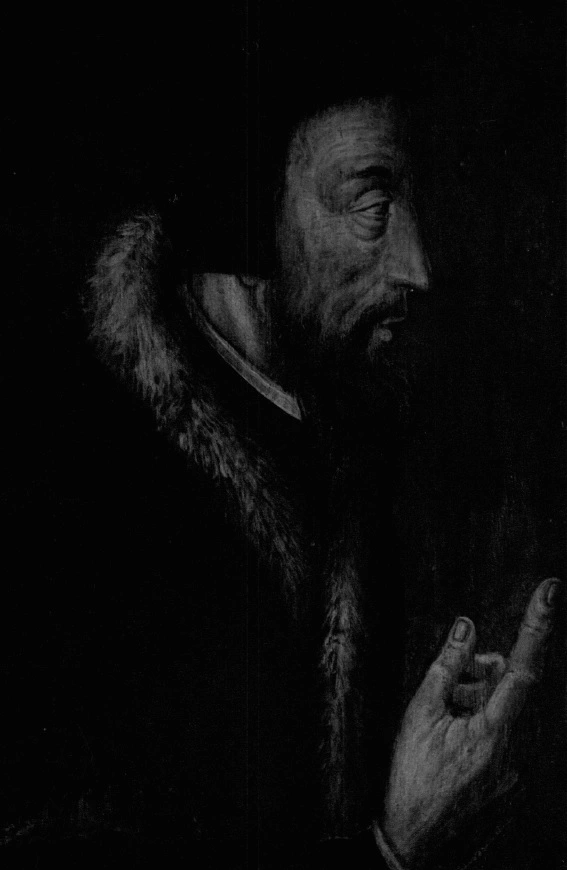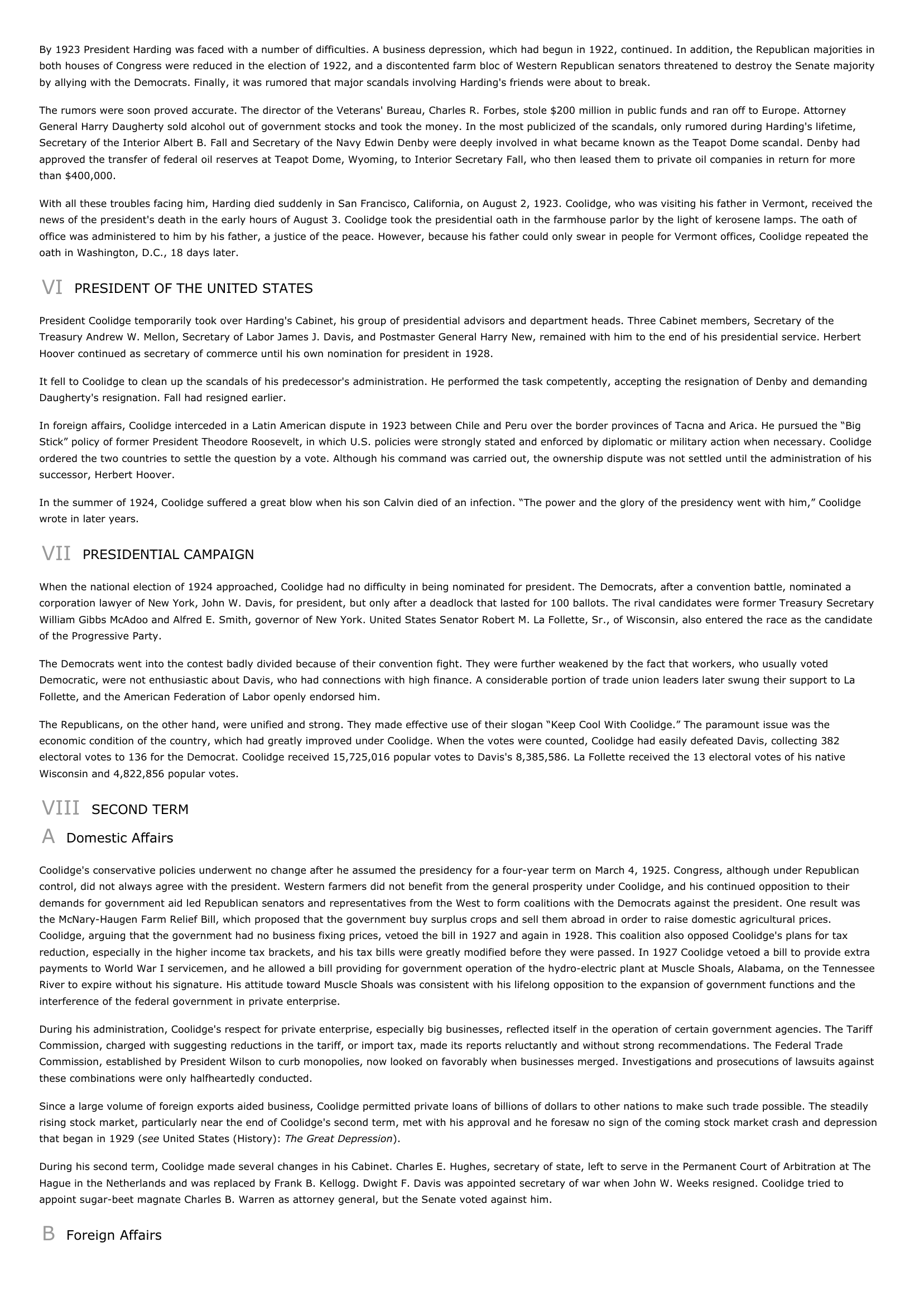Calvin Coolidge.
Publié le 10/05/2013

Extrait du document


«
By 1923 President Harding was faced with a number of difficulties.
A business depression, which had begun in 1922, continued.
In addition, the Republican majorities inboth houses of Congress were reduced in the election of 1922, and a discontented farm bloc of Western Republican senators threatened to destroy the Senate majorityby allying with the Democrats.
Finally, it was rumored that major scandals involving Harding's friends were about to break.
The rumors were soon proved accurate.
The director of the Veterans' Bureau, Charles R.
Forbes, stole $200 million in public funds and ran off to Europe.
AttorneyGeneral Harry Daugherty sold alcohol out of government stocks and took the money.
In the most publicized of the scandals, only rumored during Harding's lifetime,Secretary of the Interior Albert B.
Fall and Secretary of the Navy Edwin Denby were deeply involved in what became known as the Teapot Dome scandal.
Denby hadapproved the transfer of federal oil reserves at Teapot Dome, Wyoming, to Interior Secretary Fall, who then leased them to private oil companies in return for morethan $400,000.
With all these troubles facing him, Harding died suddenly in San Francisco, California, on August 2, 1923.
Coolidge, who was visiting his father in Vermont, received thenews of the president's death in the early hours of August 3.
Coolidge took the presidential oath in the farmhouse parlor by the light of kerosene lamps.
The oath ofoffice was administered to him by his father, a justice of the peace.
However, because his father could only swear in people for Vermont offices, Coolidge repeated theoath in Washington, D.C., 18 days later.
VI PRESIDENT OF THE UNITED STATES
President Coolidge temporarily took over Harding's Cabinet, his group of presidential advisors and department heads.
Three Cabinet members, Secretary of theTreasury Andrew W.
Mellon, Secretary of Labor James J.
Davis, and Postmaster General Harry New, remained with him to the end of his presidential service.
HerbertHoover continued as secretary of commerce until his own nomination for president in 1928.
It fell to Coolidge to clean up the scandals of his predecessor's administration.
He performed the task competently, accepting the resignation of Denby and demandingDaugherty's resignation.
Fall had resigned earlier.
In foreign affairs, Coolidge interceded in a Latin American dispute in 1923 between Chile and Peru over the border provinces of Tacna and Arica.
He pursued the “BigStick” policy of former President Theodore Roosevelt, in which U.S.
policies were strongly stated and enforced by diplomatic or military action when necessary.
Coolidgeordered the two countries to settle the question by a vote.
Although his command was carried out, the ownership dispute was not settled until the administration of hissuccessor, Herbert Hoover.
In the summer of 1924, Coolidge suffered a great blow when his son Calvin died of an infection.
“The power and the glory of the presidency went with him,” Coolidgewrote in later years.
VII PRESIDENTIAL CAMPAIGN
When the national election of 1924 approached, Coolidge had no difficulty in being nominated for president.
The Democrats, after a convention battle, nominated acorporation lawyer of New York, John W.
Davis, for president, but only after a deadlock that lasted for 100 ballots.
The rival candidates were former Treasury SecretaryWilliam Gibbs McAdoo and Alfred E.
Smith, governor of New York.
United States Senator Robert M.
La Follette, Sr., of Wisconsin, also entered the race as the candidateof the Progressive Party.
The Democrats went into the contest badly divided because of their convention fight.
They were further weakened by the fact that workers, who usually votedDemocratic, were not enthusiastic about Davis, who had connections with high finance.
A considerable portion of trade union leaders later swung their support to LaFollette, and the American Federation of Labor openly endorsed him.
The Republicans, on the other hand, were unified and strong.
They made effective use of their slogan “Keep Cool With Coolidge.” The paramount issue was theeconomic condition of the country, which had greatly improved under Coolidge.
When the votes were counted, Coolidge had easily defeated Davis, collecting 382electoral votes to 136 for the Democrat.
Coolidge received 15,725,016 popular votes to Davis's 8,385,586.
La Follette received the 13 electoral votes of his nativeWisconsin and 4,822,856 popular votes.
VIII SECOND TERM
A Domestic Affairs
Coolidge's conservative policies underwent no change after he assumed the presidency for a four-year term on March 4, 1925.
Congress, although under Republicancontrol, did not always agree with the president.
Western farmers did not benefit from the general prosperity under Coolidge, and his continued opposition to theirdemands for government aid led Republican senators and representatives from the West to form coalitions with the Democrats against the president.
One result wasthe McNary-Haugen Farm Relief Bill, which proposed that the government buy surplus crops and sell them abroad in order to raise domestic agricultural prices.Coolidge, arguing that the government had no business fixing prices, vetoed the bill in 1927 and again in 1928.
This coalition also opposed Coolidge's plans for taxreduction, especially in the higher income tax brackets, and his tax bills were greatly modified before they were passed.
In 1927 Coolidge vetoed a bill to provide extrapayments to World War I servicemen, and he allowed a bill providing for government operation of the hydro-electric plant at Muscle Shoals, Alabama, on the TennesseeRiver to expire without his signature.
His attitude toward Muscle Shoals was consistent with his lifelong opposition to the expansion of government functions and theinterference of the federal government in private enterprise.
During his administration, Coolidge's respect for private enterprise, especially big businesses, reflected itself in the operation of certain government agencies.
The TariffCommission, charged with suggesting reductions in the tariff, or import tax, made its reports reluctantly and without strong recommendations.
The Federal TradeCommission, established by President Wilson to curb monopolies, now looked on favorably when businesses merged.
Investigations and prosecutions of lawsuits againstthese combinations were only halfheartedly conducted.
Since a large volume of foreign exports aided business, Coolidge permitted private loans of billions of dollars to other nations to make such trade possible.
The steadilyrising stock market, particularly near the end of Coolidge's second term, met with his approval and he foresaw no sign of the coming stock market crash and depressionthat began in 1929 ( see United States (History): The Great Depression ).
During his second term, Coolidge made several changes in his Cabinet.
Charles E.
Hughes, secretary of state, left to serve in the Permanent Court of Arbitration at TheHague in the Netherlands and was replaced by Frank B.
Kellogg.
Dwight F.
Davis was appointed secretary of war when John W.
Weeks resigned.
Coolidge tried toappoint sugar-beet magnate Charles B.
Warren as attorney general, but the Senate voted against him.
B Foreign Affairs.
»
↓↓↓ APERÇU DU DOCUMENT ↓↓↓
Liens utiles
- Calvin Coolidge - Biography.
- Calvin Coolidge
- «Les affaires de l'Amérique sont les affaires» de Calvin Coolidge
- Coolidge Calvin
- Calvin Coolidge




